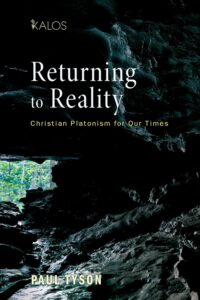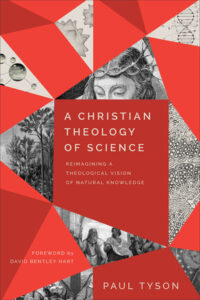

These two books by author Paul Tyson, while different in their subject matter and approaches, are both related to an overall project of challenging the hegemony of secular modernity as the default world view of Western culture and academia. Because secular modernity, with its materialist, consumerist, rationalist, and pragmatic assumptions, is the “wallpaper” or background understanding of reality we all live with, it is very difficult to approach “reality” or the grounding of our philosophical assumptions in a way different than the one we take for granted.
Paul Tyson is willing to make such a challenge. In his earlier book, Return to Reality, he attempts to make the case for a critical re-appropriation of a Christian Platonist world view. The re-appropriation of such a “participatory metaphysics” – the idea that all reality is ultimately dependent on and suspended from a Divine reality outside of the empirically verifiable realities investigated by scientific research – is also a project supported by the practitioners of the Radical Orthodoxy movement. He argues that such a world view is not only compatible with Christianity, it also arises naturally from the metaphysical assumptions of the New Testament writers. The second book, A Christian Theology of Science, seeks to approach natural knowledge (the scientific investigation of natural phenomena) from a Christian Platonist perspective.
Because I am a long-time follower of the Radical Orthodoxy movement, I am very sympathetic to the proposals put forward by Paul Tyson. The idea is not to reconstruct some nostalgic premodern utopia, but to challenge the current destructive and dehumanizing tendencies in secular modernity with an alternative modernity which is not beholden to the assumptions and prejudices of the European Enlightenment.
But even if one does not support every aspect Paul Tyson’s critique, it must be said that the Church in North America must wake up to the corrosive effects that secular modernity has had upon it. When North American culture was rapidly secularized in the 1960s, the majority of Church people (including Church leaders) assumed that the process of secularization was something to be welcomed, or a benign cultural trend that could be accommodated by changes to the Church’s theology and worship. It is only now, in the face of institutional collapse, that the churches in North America are beginning to question whether their wholesale capitulation to the materialist and consumerist assumptions of secular modernity was a mistake. For those who look past the current secular malaise to a postmodern future, these books make for a challenging, thought-provoking, and edifying read.
The Rev’d Canon Dr. Gordon R. Maitland (9T0, 0T2, 1T8) is a parish priest at St. John’s in Windsor, Ontario.
